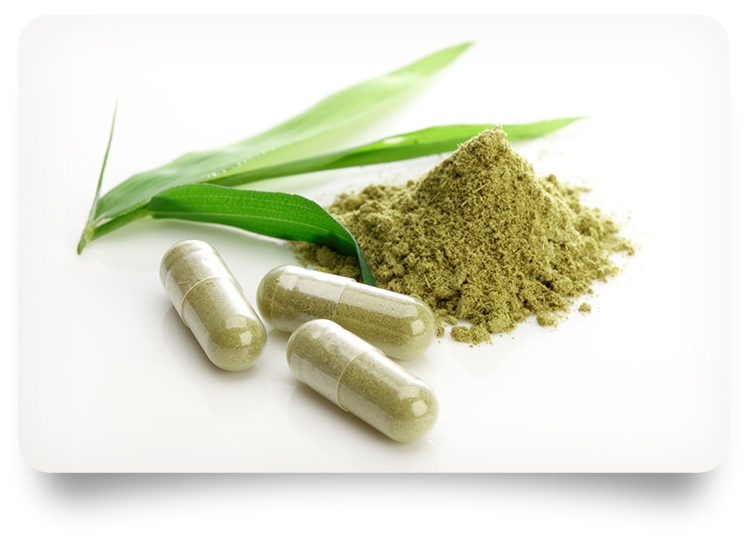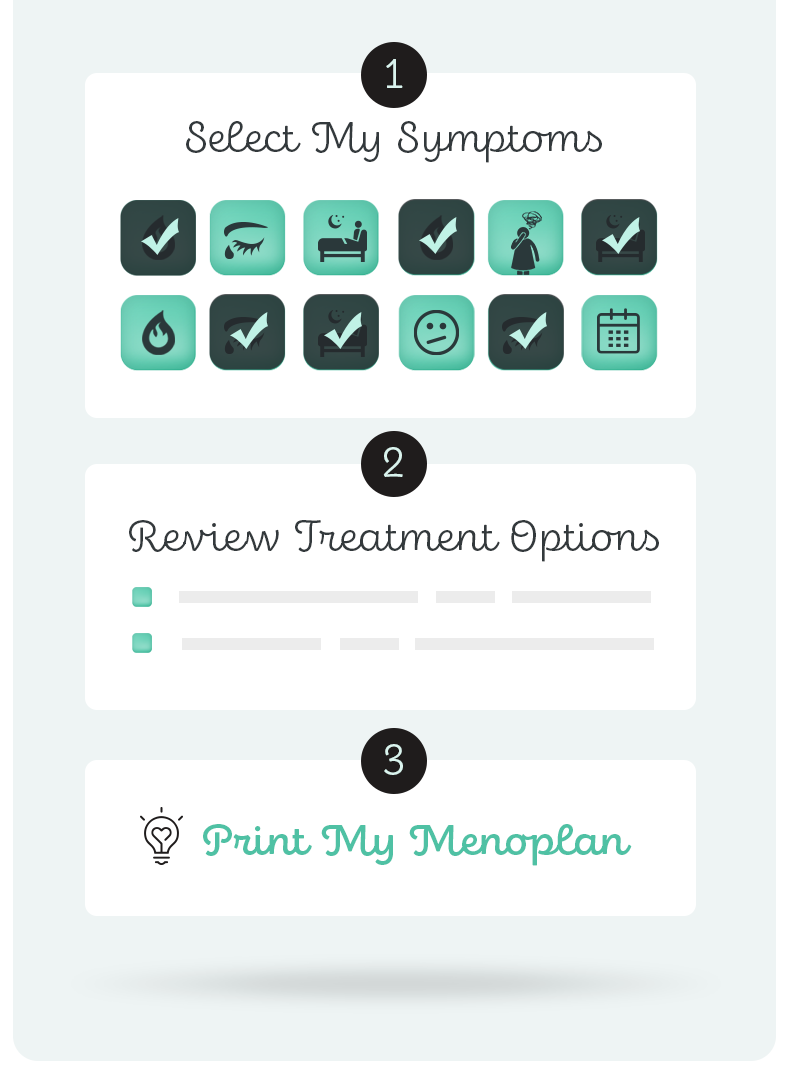Treatments
WHAT ARE THEY?
Herbal and botanical products come from plants. A wide variety of herbs and botanicals have been studied for their effects on menopause symptoms. It is hard to get clear answers because of the limited number of studies and because many of the studies are done by the companies that make the products.
OUR BOTTOM LINE: DO THEY HELP?
NO/DON’T KNOW. While there is little risk in trying herbal products, other than the expense, we do not support their use for menopause symptoms. The evidence is either too limited to draw a conclusion or shows that herbal supplements to not help with menopause symptoms. Below we provide more information about specific products.
BLACK COHOSH (Actaea racemosa or Cimicifuga racemosa)
What is it?
Black cohosh, (Actaea racemose), has been used by Native Americans as a medicinal plant but not for menopause symptoms. It is a member of the buttercup family. It is one of the most used botanicals for menopausal symptoms. Its active ingredients, if any, are unknown. It is also one of the most studied herbal products for menopause symptoms.
Bottom line – does it help?
Overall, across many studies, there is no difference between black cohosh and placebo in either frequency of hot flashes, in overall menopause symptoms, or in menopause related quality of life.
Risks
Black cohosh appears to be safe. It does not change estrogen levels, does not affect the endometrium, and is not difference from placebo in side effects.
WILD YAM (discorea barbasco, D Mexicana, D villosa).
What is it?
Wild yam, or Mexican Yam, is a tuber. The tuber contains a chemical that can be used to make synthetic progesterone. Without these chemical changes it has no active ingredients that should affect menopause symptoms.
Bottom line – does it help?
It does not work but evidence is limited. One small study found no difference between wild yam cream and placebo cream in treating hot flashes.
Risks
There are no known risks with wild yam cream.
DONG QUAI (angelica sinensis)
What is it?
Dong quai is a flowering herb in the same family as carrots and celery. In China, Korea, and Japan its dried root is used for medicinal purposes including promoting healthy blood. It is also used for menstrual cramps.
Bottom line – does it help?
It does not work but evidence is limited. There is no evidence of estrogen-like activity in human studies.
Risks
There is no evidence of estrogen-like activity in human studies. It has no effect on the vaginal lining or endometrial thickness. It may cause skin irritation and sun sensitivity. It may slow blood clotting and should not be used with other products that affect blood clotting. Pregnancy women should not use it.
EVENING PRIMROSE (Oenotheria biennis L)
What is it?
Evening Primrose is a flowering plant rich in linolenic acid.
Bottom line – does it help?
There is not enough evidence to say whether it helps or not.
Risks
Evening primrose may cause upset stomach and headache. Oral use may increase bleeding risk. It should not be used by people with a bleeding disorder. It should not be used by people with epilepsy or schizophrenia because of increased risk of seizures. There are many possible drug interactions, and you should check with a health care provider or pharmacist before using this herb.
FLAX SEED (linum usitatissimum)
What is it?
Flax is a food crop from Southern Europe and Asia. Flaxseeds are the golden yellow to reddish brown seeds of flax. Flaxseed, or linseed is a rich source of omega-3 fatty acids. Flax seeds contain estrogen-like compounds called phytoestrogens. Chemicals in the cell wall of flaxseed, called lignans, produce enterodiol and enterolactone when acted on by the gut. These lignans are only bioavailable after extensive crushing. Thus, milled flax flour and meal, but not flaxseeds or flaxseed oil, are sources of these lignans. Enteroldiol and enterolactone can act like weak estrogens by binding to estrogen receptors.
Bottom line – does it help?
It does not work. Among 5 randomized trials, none reported benefit for hot flash frequency or severity beyond placebo.
Risks
Flaxseed is safe overall with some cautions. If taken in large amounts it can cause bloating, gas, and diarrhea. Because of possible anticoagulant effects it may increase bleeding risk if taken with other anticoagulant or anti-platelets drugs, herbs, or supplements. There are many possible drug interactions, and you should check with a health care provider or pharmacist before using flax seeds for medicinal purposes.
CHINESE HERBS
What are they?
A wide variety of Chinese herbal products have been proposed to treat menopause symptoms. Many of these come from treatments used in traditional Chinese medicine.
Bottom line – does it help?
While some studies are promising, overall, there is insufficient information to say whether or not these products work.
Risks
This depends on the specific herbs being used.
OTHER PRODUCTS
What are they?
Other products have been studied include ginseng, hops, maca, omega-3 fatty acids, pine bark, pollen extract, kwao krua, and Siberian rhubarb.
Bottom line – do they help?
While findings for some have been inconclusive none have been tested sufficiently to endorse their use.
Risks
This depends on the specific products being used.
IF I WANT TO TRY ANY OF THESE TREATMENTS WHAT ARE MY NEXT STEPS?
We do not recommend herbal products and supplements for menopause symptoms.
Borrelli F, Ernst E. Black cohosh (Cimicifuga racemosa) for menopausal symptoms: a systematic review of its efficacy. Pharmacol Res. 2008;58(1):8–14. doi:10.1016/j.phrs.2008.05.008
Franco OH, Chowdhury R, Troup J, et al. Use of Plant-Based Therapies and Menopausal Symptoms: A Systematic Review and Meta-analysis. JAMA. 2016;315(23):2554–2563. doi:10.1001/jama.2016.8012
Leach MJ, Moore V. Black cohosh (Cimicifuga spp.) for menopausal symptoms. Cochrane Database Syst Rev. 2012;2012(9):CD007244. Published 2012 Sep 12. doi:10.1002/14651858.CD007244.pub2
NIH Office of Dietary Supplements. Fact sheet for health professional. Black cohosh. https://ods.od.nih.gov/factsheets/BlackCohosh-HealthProfessional/ (accessed 04/28/2021)
Nonhormonal management of menopause-associated vasomotor symptoms: 2015 position statement of The North American Menopause Society. Menopause. 2015;22(11):1155–1174. doi:10.1097/GME.0000000000000546
Authors: Dr. Katherine Newton, & Dr. Leslie Snyder. Last reviewed February 15, 2021



